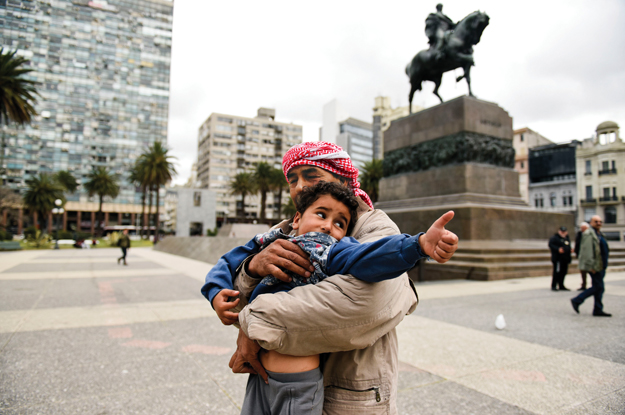To see our entire feature on Syrian refugees in Latin America, click here.
Uruguay’s invitation in late 2014 sounded like a dream to the Alshebli family, who had been living in a cramped Lebanon apartment for more than a year since they fled Syria. Not only would all 17 Alsheblis receive asylum, they would also be given a spacious new home and two years of income assistance.
But it didn’t take long for a series of cultural and financial shocks to leave them feeling defeated. A year after arriving, family patriarch Merhi Alshebli was still unemployed, his children were struggling to integrate, and he felt trapped. During a meeting with officials to discuss their situation, he doused himself with fuel and threatened to light himself on fire unless Uruguay helped them leave — even if it meant returning to Lebanon.
“What can I do to buy food for all of my children?” the 51-year-old later said during an interview with AQ at his government-provided home in the countryside.
The Alsheblis’ frustration was not unusual for the 42 Syrians granted asylum by Uruguay in 2014. Life was pricier than expected; the Alsheblis’ first electricity bill consumed much of their stipend. Rules were strange; only after investing in a sheep herd did Merhi learn it was illegal to let them roam free to graze, forcing him to sell the few that didn’t starve. Merhi’s daughters started a street food business, but a rumor of food poisoning forced them to close.
By September 2015, they’d had enough. The Alsheblis and other Syrians protested in Montevideo, demanding to be relocated. The government said they were free to go, although it would not ask another nation to accept them, limiting their options. Merhi’s threat of self-immolation escalated tensions; he was treated for a nervous breakdown and fined a month’s worth of assistance.
Despite the strains, Uruguay plans to accept more Syrians — although the Alsheblis’ ongoing struggles are a cautionary tale. As AQ went to press, the family was negotiating to be relocated to a farm where Merhi might raise sheep and start earning an income before their government stipend ends in late 2016. Meanwhile, Merhi’s children have taken on the burden of supporting the family. His 19-year-old daughter, Nada, found work in a nursing home, while his 21-year-old son, Ibrahim, gave up his dream of studying electronics to work in construction.
“What will happen when the government aid runs out?” Ibrahim wondered. “I spend the days thinking it over and over.”
—
Haberkorn is a prize-winning investigative journalist for the Associated Press in Montevideo



